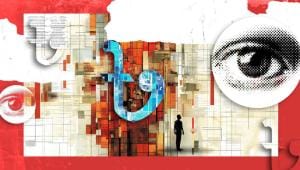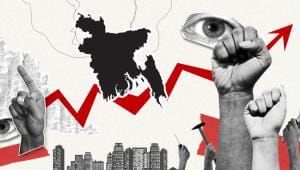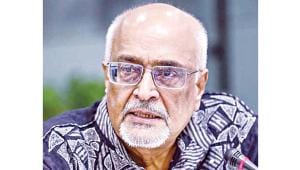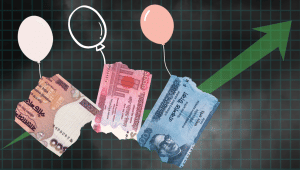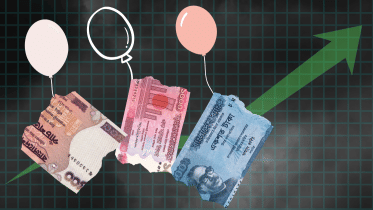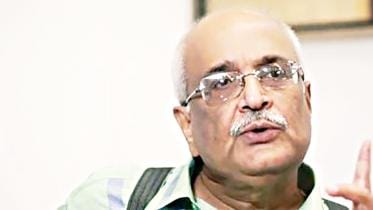Why we need to revisit the LDC paradigm
It has been more than five decades since the UN established the Least Developed Countries (LDC) category, in 1971, identifying these countries as facing the most severe roadblocks to sustainable development.
3 December 2025, 18:00 PM
Political alignment is key to a desirable future
This is the final instalment in a three-part series based on a foresight analysis centred on Bangladesh’s transition.
23 July 2025, 04:00 AM
The plausible future facing the country
This is the second instalment of a three-part series based on a foresight analysis centred on Bangladesh’s transition.
22 July 2025, 04:00 AM
A unique approach to looking at the future
This is the first instalment of a three-part series based on a foresight analysis centred on Bangladesh’s transition.
21 July 2025, 03:00 AM
Bangladesh's shared GIs with India: The conflict and the outlook
In the recent past, the topic of shared Geographical Indications (GI) between India and Bangladesh has frequently appeared in public discourse.
5 November 2024, 03:00 AM
Old malaise flaring up
The budget for the upcoming fiscal year, presented in the context of inordinately complex economic circumstances, reflects both the government’s restraint and limitations.
6 June 2024, 18:00 PM
The fault lines are catching up
The trade-off between growth and inflation is pretty apparent. It implies loss of employment and income. The critical factor in this respect is the availability and effective use of the government's fiscal space.
6 June 2024, 17:50 PM
Denial syndrome is hampering our economic policies
Interventions must involve fiscal policy to address our fundamental economic issues
12 November 2022, 16:00 PM
Denial syndrome is hampering our economic policies
Interventions must involve fiscal policy to address our fundamental economic issues
12 November 2022, 15:34 PM
Celebrating Fulbright Program on the golden jubilee of US-Bangla partnership
Recently, Bangladesh and the United States have celebrated half a century of their multifaceted partnership.
14 May 2022, 18:00 PM
Bidding Adieu to Emeritus Publisher Mohiuddin Ahmed
Emeritus publisher Mohiuddin Ahmed, the doyen of Bangladesh’s publishing industry, left us on June 22, 2021. As it is said, life ends but memories do not. When I recall my association with him, three distinctive episodes and numerous encounters flash across my mind.
8 July 2021, 18:00 PM
Unpacking the Covid-19 stimulus packages: The devil is in the details
The history of designing and delivering policy-driven economic stimulus packages is customarily traced back to the “New Deal” which was implemented in the United States during the Great Depression of the 1930s.
27 May 2021, 18:00 PM
Bangladesh’s LDC Graduation
The most quoted line of modern English: “To be, or not to be, that is the question . . .”, as is known, is the opening stroke of a soliloquy from William Shakespeare’s celebrated drama The Tragedy of Hamlet, Prince of Denmark.
14 November 2020, 18:00 PM
Extraordinary times, ordinary budget
The much-anticipated national budget for fiscal year 2020-21 turns out to be a document trying to run on the momentum.
11 June 2020, 18:00 PM
Data distraction and our budget
As success has many fathers, witty comments too have many misattributed sources. For example, the sentence that “there are three kinds of lies: lies, damned lies, and statistics” was mistakenly attributed by author extraordinaire Mark Twain to British Prime Minister Benjamin Disraeli.
10 June 2020, 18:00 PM
Should Bangladesh defer LDC graduation?
Bangladesh has attained considerable development progress in the past three decades.
15 May 2020, 18:00 PM
Mahatma Gandhi and the Sustainable Development Goals
The world today will celebrate the 150th birth anniversary of Mahatma Gandhi. Twelve years back, the United Nations voted to declare the date as the “International Day of Non-Violence.” When people usually speak about this iconic persona, they often highlight him as
1 October 2019, 18:00 PM
National budget measured through five senses
According to the great philosopher Immanuel Kant, “all our knowledge begins with senses, proceeds then to understanding, and ends with reason.
9 June 2019, 18:00 PM
Learning from peers and graduates
The outlook for the United Nations' (UN) list of least developed countries (LDCs) is finally looking optimistic after 47 years of lacklustre performance since the category's establishment in 1971. There have been 52 inclusions and only five graduations to date according to the UN Committee for Development Policy's (CDP) triennial reviews. Bangladesh, an LDC, remains on track for graduation.
21 March 2018, 18:00 PM
Clarifying the MIC-LDC confusion
The national development discourse in Bangladesh often mistakenly considers graduating from the Least Developed Country (LDC) category and becoming a middle-income country (MIC) as interchangeable. Senior-level policymakers continue to express their aspiration for the country to join the middle-income group by 2021, which marks the 50th anniversary of Bangladesh's independence.
20 March 2018, 18:00 PM



